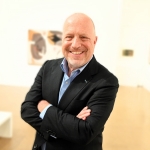Academic Rigor through the Arts

Deb Vaughn

Deb Vaughn

Jen Delos Reyes
Eloise Damrosch became executive director of the Regional Arts & Culture Council in Portland, OR, in 2004 after serving as Director of Public Art for 17 years. She continues to lead the Public Art Program and helped RACC launch its successful workplace giving program, tri-county arts education initiative, and had a leadership role in the November 2012 passage of a ballot measure creating the Arts Education and Access Fund which will raise through a modest income tax over $12 million new dollars to restore art and music teachers to every Portland elementary school; strengthen arts


Providing constant and protected space for the exchange of ideas is critically important to the health of our business through the active engagement of our employees. All businesses need new ideas, and businesses benefit when the generation of ideas is encouraged and inclusive. To thrive, businesses need to provide a setting where ideas can be openly exchanged and tested. It is the responsibility of business leaders to understand that the work we all do is best done in an environment that’s not based on the ownership of ideas or the rank of those that offer them—but rather one that’s open, collaborative, and receptive to new ways of thinking and doing. Business leaders need to make intentional steps towards creating these spaces. Otherwise, we miss the opportunity to unleash and develop the inherit creative talent of our employees.
Read More

As arts educators, we should always try to dream big. We don’t need a Broadway budget to create good educational theatre. What we need are dedicated arts educators who are passionate about the message of the production and how it can be a transformative experience for young people. So many students often tell us that this may be the first play they have ever seen and how powerful the storytelling experience was for them. Rain, sleet, or snow, like the post office, we always deliver an authentic theatre experience; no matter where we go or how we get there, the rewards are always worth the effort.
Read More

In a society struggling to find equity and social justice, Americans believe the arts improve the quality of our communities. How do we know? We asked. Americans Speak Out About the Arts in 2018 is the second in a series of national public opinion surveys conducted by Ipsos on behalf of Americans for the Arts. One of the largest ever conducted, it gauges the public perspective on (1) personal engagement in the arts as audience and creator, (2) support for arts education and government arts funding, (3) opinions on the personal and well-being benefits that come from engaging in the arts, and (4) how those personal benefits extend to the community. Here are some findings of the survey.
Read More

KRIS Wines has partnered with Americans for the Arts to celebrate the value of public art in American communities, and reward the artists who create it. They’re giving away $25,000 in prizes to artists who have recently completed projects in the United States, and your votes—up to once per day at kriswine.com/giving—will determine the winners.
Read More

I work in the nonprofit arts sector in Portland, Oregon, which is 76% white despite the growing racial and ethnic diversity in the country. This whiteness was deliberately designed. In the 1800s, exclusionary laws were ratified into the Oregon constitution and the language wasn’t officially removed until 2002. This history is reflected in who lives, works, and plays here, including the demographic makeup of who runs our cultural and artistic institutions. In 2016, a group of us arts administrators came together with the evocative question: “Why are the arts so white?” A truly grassroots operation, Arts Workers for Equity (AWE) is a collective of ten individuals who represent a multitude of intersectional identities. Alone and individually, we had limited power to effect change. But collectively we’ve influenced Portland’s nonprofit arts sector, citywide.
Read More